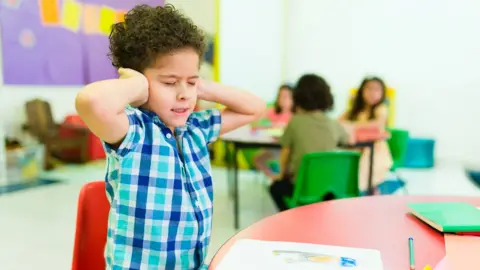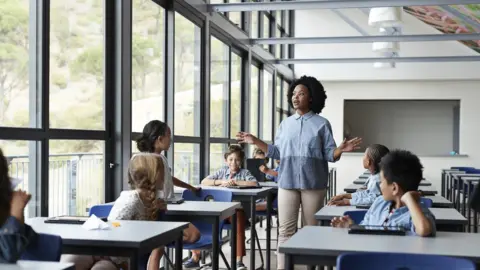Autistic and gifted: 'We have no support'
 Getty Images
Getty ImagesA mother to a gifted autistic girl has resorted to home-schooling her daughter, because she says the school system offers no suitable support for her needs. She is one of four parents who have spoken to the BBC about their struggles to get their children the education they deserve.
By the time Anya* was 10, she was reading books about maths and physics aimed at adults and at the age of 12, she taught herself Japanese.
She loves learning, but the experience of going to school - a place with lots of people and stimuli - is "extremely anxiety-inducing and overwhelming", her mother Laura says.
"I just feel very let down because I know if she could go to a school with small groups of people and teachers who understand autism she could thrive, but it's now on us as family because we don't get any support."
Primary school was tough, Laura says. "She couldn't stand having to go out and play in breaks - it made her super-anxious."
So when it came to choosing a secondary school for Anya, her mum looked at what the local council had to offer and realised there only seemed to be two options: Anya could either go to a mainstream school or a school for pupils with special educational needs (special school).
Many mainstream schools, she says, seemed willing to help. "But they simply don't have the funding to offer any kind of suitable support," Laura says.
Special schools are designed for pupils who have learning difficulties and are not able to follow the national curriculum, "so those definitely wouldn't be right for Anya", Laura says.
However, there is a third option Laura did not know about: independent schools.
There are hundreds of independent schools that provide better support for neuro-diverse children such as Anya than mainstream or special schools, offering things like smaller class sizes, one-to-one teaching and speech and language therapy.
 Getty Images
Getty ImagesIf a parent manages to make a case to their local authority that a particular independent school would meet their child's needs better than what is offered in the local area, the council could in theory fund the child's place at that school.
All this would be set out in the child's education, health and care (EHC) plan.
These schools tend to be oversubscribed, so in many cases the child has to go to a school out of their local area and the council will pay for the child's taxi there and back every day, says Tom Purser, head of guidance, volunteering and campaigns at the National Autistic Society (NAS).
However, he says councils "are often motivated to pick the choice which is easiest for them, in our experience" - that is, mainstream or special schools in their area directly funded by them. This means that independent school route is not usually achieved without a fight between parents and councils, Mr Purser adds.
Parents unhappy about their local authority's decisions regarding their child's special educational needs can appeal to the Special Educational Needs and Disability (SEND) Tribunal.
In 2021-22, half of all SEND appeals related to children with autistic spectrum disorder, and 96% of cases decided were in favour of the parents, according to the government's latest figures.
Laura says she did not pursue an EHC plan because it would have been a lengthy process, and the choices she thought were open to her - special or mainstream school - would not have been suitable anyway.
Once she became aware that an independent school was an option, she looked through the choices and found no mention of special support for gifted children with autism. "And that's exactly the problem," Laura says.
 Getty Images
Getty ImagesIn 2021-22, there were 182,493 children with autism recorded in the school system across England, 12% more than the year before when there were 163,041, according to government figures.
Nearly three-quarters of 3,470 parents surveyed by the NAS in England in 2021 said their child's school place did not fully meet their needs - this figure has almost doubled since 2017 when it previously carried out the survey.
"Need is growing and provision is not keeping pace with that," Mr Purser says.
The reasons families are unhappy vary, he says. "We sometimes hear of pupils with a high educational potential who have a number of behavioural issues who are more comfortable in a local authority special school even though they might be capable of more.
"We hear of cases involving a lack of access to occupational therapy, or it might be the physical environment that the pupils struggle with due to their sensory needs. Some pupils can find a mainstream classroom difficult to access."
'Our son doesn't like writing things down'
Nick and Sarah's eight-year-old son Zeke has attention deficit hyperactivity disorder (ADHD) and autism. During his first year of primary school his behavioural issues were so severe he had to be restrained daily.
Since then, his school has put a number of measures in place to cater for him, including a sensory class, which Nick and Sarah say they are grateful for and which has improved things.
However, he still struggles and "the school tells us he does about 10 minutes of learning a day - that's not enough learning," Nick says. "The rest of the time he just hovers, and they let him do what he wants for the sake of keeping the peace in the classroom."
It is a struggle getting Zeke to school most mornings, Sarah says. "He lacks the social awareness of other people. He doesn't gel with all the teachers or most kids. So he never wants to go."
"He is a smart boy," she says, "but his teachers have described him as 'unmarkable' because he's not putting information down on paper.
"He's not participating in all the tests and paperwork necessary to assess him. But he loves problem-solving and maths, and in Year Two, when he did complete one test, he got 100%. The teachers were gobsmacked. I think he would be above average if he had the right testing environment."
 Getty Images
Getty Images"One weekend, he read a whole book called Diary of a Wimpy Kid," Sarah says. "His peers were reading it for weeks.
"If he's interested in something he gets hyper-focused. He just doesn't comply with the average way of assessing children."
Sarah says Zeke often has violent outbursts during which he physically and verbally lashes out at his parents, older brother or other children, but she has received no guidance from her GP, paediatrician or school about how to deal with them.
They think my daughter is a 'spoilt brat'
Nancy's daughter Elsie is 15 years old and has been diagnosed with Asperger's and autistic spectrum disorder.
Elsie has "issues picking up on social cues and the teachers often misinterpret it as her being rude and naughty", Nancy says.
"She can also be very abrupt and sometimes communicates by grunting, so the teachers - some of whom don't even know about her diagnosis - think she's simply a spoilt brat.
"They know about every child's nut allergy, so why can't they ensure they know about an autism diagnosis and adjust their expectations accordingly?
"My daughter is getting on fine academically but she constantly feels out of place, misunderstood and like some kind of weirdo."
What is the government doing?
The government published its Special Educational Needs and Disabilities and Alternative Provision Improvement Plan on 2 March. It includes proposals to bring state-funded specialist providers up to a standard comparable to that of independent schools, create new guides for professionals to help them provide the right support and invest in 33 new special free schools.
The government says it is increasing its investment into the high-needs budget, worth £10.1bn by 2023-24, which it says is 50% more than four years ago.
Claire Coutinho, minister for children, families and wellbeing, said: "For some parents of children with special educational needs and disabilities, getting their child that superb education that everyone deserves can feel like a full-time job.
"This improvement plan sets out systemic reforms to standards, teacher training and access to specialists, as well as thousands of new places at specialist schools so that every child gets the help they need."
However, the plan has been criticised by autism charities for not going far enough.
Ambitious about Autism described it as "another missed opportunity" which "has the potential to write off another generation of autistic pupils", while NAS says it "lacks the substance needed to fix a SEND system failing autistic children and families".
Both charities have called for mandatory autism training for all school staff.
Jolanta Lasota, chief executive of Ambitious about Autism, says that, in the current system, "autistic children and young people are being written off before they've even left school".
*The names of the children children featured in this article and their parents' names have been changed to protect their anonymity

Follow BBC London on Facebook, Twitter and Instagram. Send your story ideas to [email protected]
